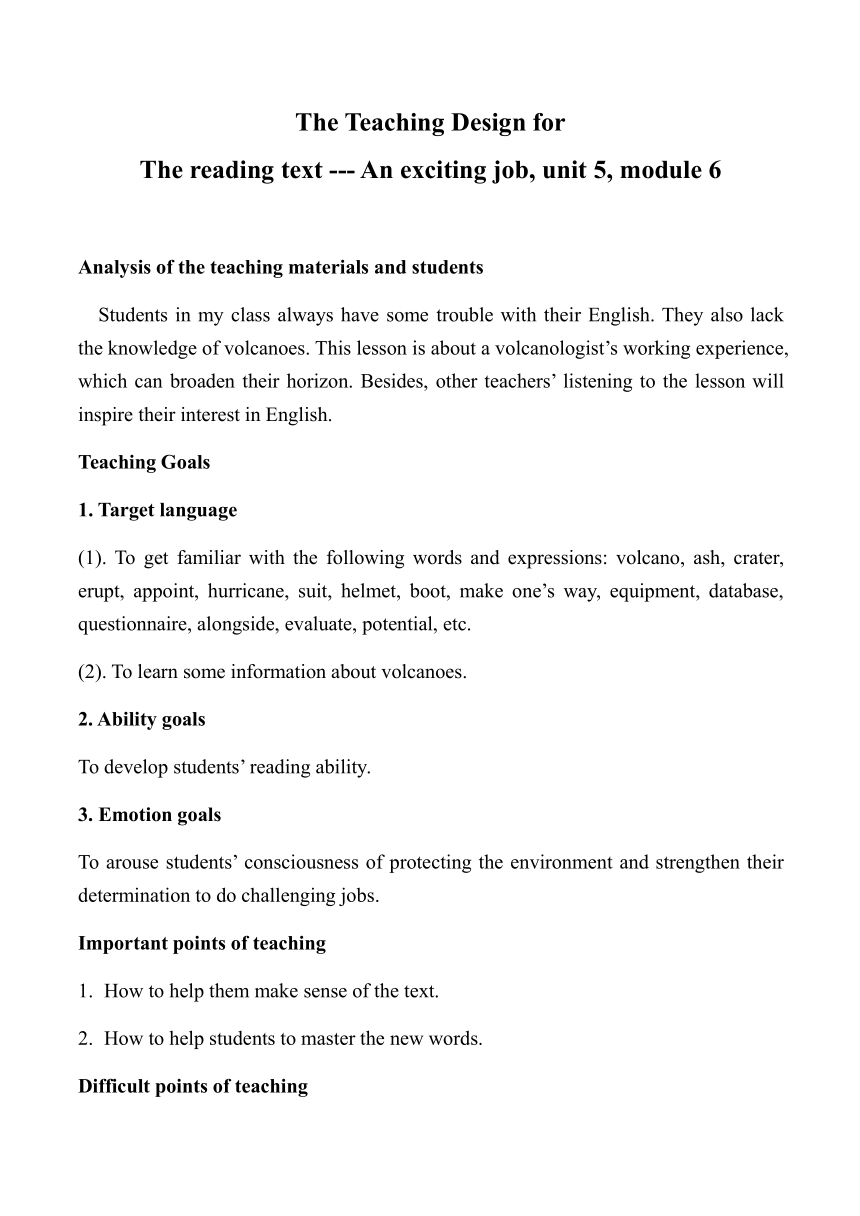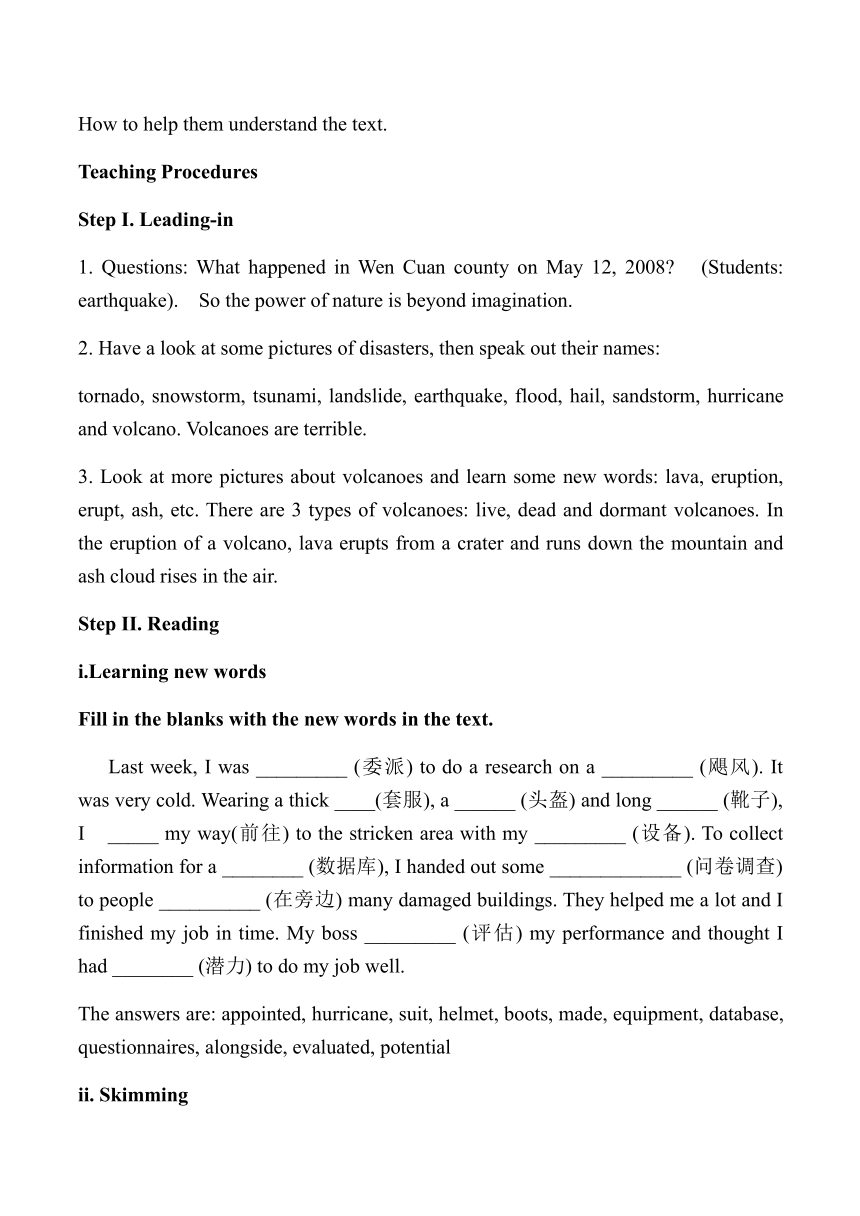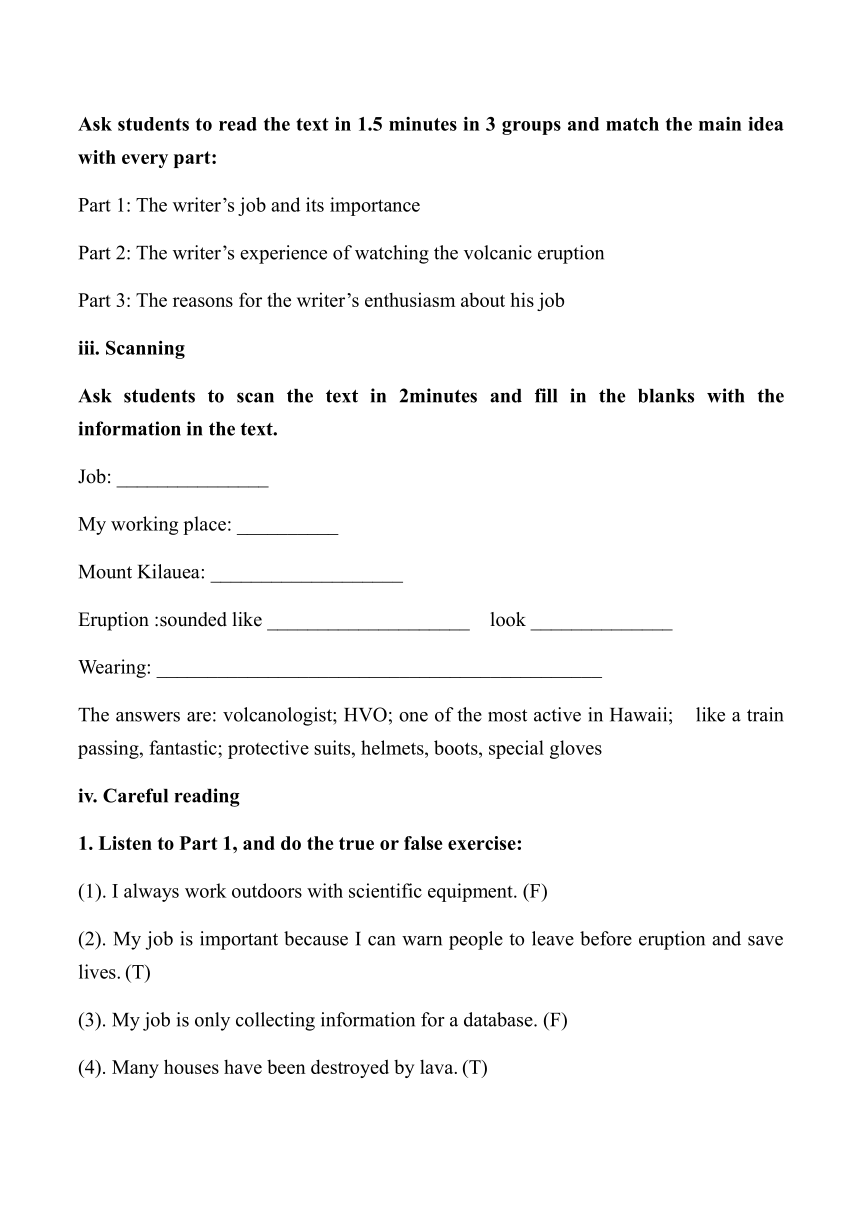高中英语人教版选修六Unit 5 Unit 5 The power of nature Reading学案(无答案)
文档属性
| 名称 | 高中英语人教版选修六Unit 5 Unit 5 The power of nature Reading学案(无答案) |

|
|
| 格式 | zip | ||
| 文件大小 | 37.0KB | ||
| 资源类型 | 教案 | ||
| 版本资源 | 人教版(新课程标准) | ||
| 科目 | 英语 | ||
| 更新时间 | 2019-12-14 21:46:16 | ||
图片预览



文档简介
The Teaching Design for
The reading text --- An exciting job, unit 5, module 6
Analysis of the teaching materials and students
Students in my class always have some trouble with their English. They also lack the knowledge of volcanoes. This lesson is about a volcanologist’s working experience, which can broaden their horizon. Besides, other teachers’ listening to the lesson will inspire their interest in English.
Teaching Goals
1. Target language
(1). To get familiar with the following words and expressions: volcano, ash, crater, erupt, appoint, hurricane, suit, helmet, boot, make one’s way, equipment, database, questionnaire, alongside, evaluate, potential, etc.
(2). To learn some information about volcanoes.
2. Ability goals
To develop students’ reading ability.
3. Emotion goals
To arouse students’ consciousness of protecting the environment and strengthen their determination to do challenging jobs.
Important points of teaching
1. How to help them make sense of the text.
2. How to help students to master the new words.
Difficult points of teaching
How to help them understand the text.
Teaching Procedures
Step I. Leading-in
1. Questions: What happened in Wen Cuan county on May 12, 2008? (Students: earthquake). So the power of nature is beyond imagination.
2. Have a look at some pictures of disasters, then speak out their names:
tornado, snowstorm, tsunami, landslide, earthquake, flood, hail, sandstorm, hurricane and volcano. Volcanoes are terrible.
3. Look at more pictures about volcanoes and learn some new words: lava, eruption, erupt, ash, etc. There are 3 types of volcanoes: live, dead and dormant volcanoes. In the eruption of a volcano, lava erupts from a crater and runs down the mountain and ash cloud rises in the air.
Step II. Reading
i.Learning new words
Fill in the blanks with the new words in the text.
Last week, I was _________ (委派) to do a research on a _________ (飓风). It was very cold. Wearing a thick ____(套服), a ______ (头盔) and long ______ (靴子), I _____ my way(前往) to the stricken area with my _________ (设备). To collect information for a ________ (数据库), I handed out some _____________ (问卷调查) to people __________ (在旁边) many damaged buildings. They helped me a lot and I finished my job in time. My boss _________ (评估) my performance and thought I had ________ (潜力) to do my job well.
The answers are: appointed, hurricane, suit, helmet, boots, made, equipment, database, questionnaires, alongside, evaluated, potential
ii. Skimming
Ask students to read the text in 1.5 minutes in 3 groups and match the main idea with every part:
Part 1: The writer’s job and its importance
Part 2: The writer’s experience of watching the volcanic eruption
Part 3: The reasons for the writer’s enthusiasm about his job
iii. Scanning
Ask students to scan the text in 2minutes and fill in the blanks with the information in the text.
Job: _______________
My working place: __________
Mount Kilauea: ___________________
Eruption :sounded like ____________________ look ______________
Wearing: ____________________________________________
The answers are: volcanologist; HVO; one of the most active in Hawaii; like a train passing, fantastic; protective suits, helmets, boots, special gloves
iv. Careful reading
1. Listen to Part 1, and do the true or false exercise:
(1). I always work outdoors with scientific equipment. (F)
(2). My job is important because I can warn people to leave before eruption and save lives. (T)
(3). My job is only collecting information for a database. (F)
(4). Many houses have been destroyed by lava. (T)
Correction:
(1).I work outdoors, in an office, use scientific equipment and meet local people and tourists.
(3). My job is collecting and evaluating information, and helping others to predict the speed of lava.
2. Listen to and read part 2 and answer the following questions:
(1). Which lava does more damage? Why?
The lava which flows like a wave does more damage, because it buries everything under the molten rock.
(2). What was the eruption like?
Ask students to retell the eruption of the volcano, using the following words: the second week, worked hard, fast asleep, bed shaking, heard a strange sound, ran out, seeing Mount Kilauea, lava fountaining; An absolutely fantastic sight!
(3). What did the scientists do after the eruption?
dressed like ________; dropped as ______ as possible to the ______; slowly ______ our way to the ______of the crater; looked down into the red, ______ center; climbed down to ______ some ______. (spacemen, close, crater, made, edge, boiling, collect, lava)
3. Read the last paragraph together and answer the question:
What does the writer find impressive about volcanoes even after studying them for many years?
Their beauty and their potential to cause great damage.
Step III. Conclusion
Ask students to read and listen to the text and fill in the blanks with the words in the text.
I have been a__________ as a v_____________ working for the HVO alongside people from all over the world. My job is collecting and e_________ information for a d_________. Then we predict where lava from the v________ will flow next and how fast. Our work has saved many lives but many houses have been b_______ to the g________.
The lava that e______ from a volcano and crashes back to earth causes far more d________, compared to the lava that flows like a w______ down the mountain.
My first sight of one eruption was in Hawaii. One night, my bed began s_______ and a strange s______ appeared, then my bedroom became as b______ as day. I ran out, seeing red hot lava f___________ high into the air. It was an a__________ fantastic sight.
After the eruption, We were driven there to have a look. Dressed in protective s_____ and like spacemen, we went closer. We made our way to the edge and looked down. The other two climbed down to c______ some lava for later study.
Today, I am still e___________ about my job and a________ at volcanoes' beauty and their p_________ to cause great damage.
The answers are: volcanologist, evaluating, database, volcano, burned, ground, erupts, damage, wave, shaking, sound, bright, fountaining, absolutely, suit, collect, enthusiastic, amazed, potential.
Step IV. Discussion
Do you want to be a volcanologist? Why or why not?
Some useful words: work outside, travel to different places, take risks, interested in studying rocks
Step V. Homework
Write an article about 80 words named: Why I (don’t) want to be a volcanologist
The Learning Guide For The Text An Exciting Job
I. Prevision exercises(预习作业):
Fill in the blanks with the new words in the text.
Last week, I was _________ (委派) to do a research on a _________ (飓风). It was very cold. Wearing a thick _______(套服), a ______ (头盔) and long ______ (靴子), I _______ my way(前往) to the stricken area with my _________ (设备). To collect information for a _________ (数据库), I handed out some _____________ (问卷调查) to people __________ (在旁边) many damaged buildings. They helped me a lot and I finished my job in time. My boss _________ (评估) my performance and thought I had ____________ (潜力) to do my job well.
II. Match the main idea with each part:
Part 1. The reasons for the writer’s enthusiasm(热情) about his job
Part 2. The writer’s job and its importance
Part 3. The writer’s experience of watching the volcanic eruption
III. True or false
1. I always work outdoors with scientific equipment. ( )
2. My job is important because I can warn people to leave before eruption and save lives. ( )
3. My job is only collecting information for a database. ( )
4. Many houses have been destroyed by lava. ( )
IV. Fill in the blanks with the words in the text. The first letter has been given.
I have been a__________ as a v_____________ working for the HVO alongside people from all over the world. My job is collecting and e_________ information for a d_________. Then we predict where lava from the v________ will flow next and how fast. Our work has saved many lives but many houses have been b_______ to the g________.
The lava that e______ from a volcano and crashes back to earth causes far more d________, compared to the lava that flows like a w______ down the mountain.
My first sight of one eruption was in Hawaii. One night, my bed began s_______ and a strange s______ appeared, then my bedroom became as b______ as day. I ran out, seeing red hot lava f___________ high into the air. It was an a__________ fantastic sight.
After the eruption, we were driven there to have a look. Dressed in protective s_____ and like spacemen, we went closer. We made our way to the edge and looked down. The other two climbed down to c______ some lava for later study.
Today, I am still e___________ about my job and a________ at volcanoes' beauty and their p_________ to cause great damage.
Students are asked to finish the exercises above before class.
